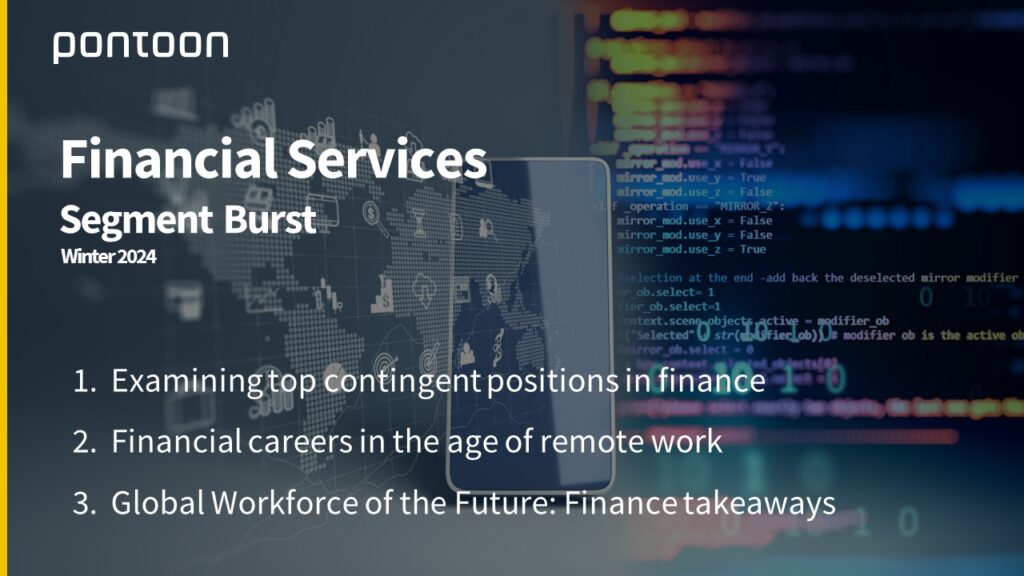Financial Services Segment Burst: Winter 2024
Research
.
In the Winter 2024 Financial Services Segment Burst, we explore the most recent trends in the sector including top contingent tech roles, human and AI collaboration in hiring, and the latest finance takeaways from our Global Workforce of the Future report.
Examining top contingent positions in finance
Contingent labour has become essential in the financial services industry, providing workforce solutions and addressing many labour challenges.
Moreover, firms that have successfully recruited contingent workers regard them as strategic assets rather than procurement costs, with increased organisational flexibility and a strategic advantage when executing critical projects.
Contract roles such as accountants, financial analysts, compliance and risk management specialists, and fintech business analysts are becoming increasingly vital. Accountants leverage digital technologies to focus on strategic tasks, while financial analysts interpret complex financial data and forecast trends. Compliance and risk management specialists navigate regulatory changes and uncertainties, ensuring adherence to standards and risk mitigation.
Meanwhile, fintech business analysts bridge the gap between finance and technology, driving innovation in the sector. After examining 2023 data from our Managed Service Provider (MSP) programmes in the financial services sector, we observed distinct trends in allocating contingent roles.
Our data reveals the three top contingent roles in 2023 and their corresponding average time to fill: Application Engineer (25.7 days), Project Manager (6.6 days), and Project Analyst (7.1 days).
Given these findings, there’s a clear need for improved strategies in sourcing and attracting technical talent in financial services. Since the Application Engineer role, a technical position, takes notably longer to fill, sourcing suitable candidates for such roles may require enhanced strategies. Employers should consider bolstering their outreach initiatives, forging educational partnerships, or strengthening in-house training to cultivate necessary skills.
The competitive market for these professionals and potentially extended negotiation phases due to higher salary expectations contribute to lengthier hiring timelines. As we look ahead to 2024, we anticipate similar trends for these roles. Therefore, having a robust contingent labour strategy in place is critical.
Financial careers in the age of remote work
The financial sector’s transition to remote work has transformed the landscape of careers in the industry. Financial services and fintech roles have evolved from traditional office settings to hybrid and flexible working arrangements. This shift is driven by technological advancements, changing workforce demographics, and an increased focus on work-life balance.
A PWC remote work study revealed that 69% of financial services companies anticipate that most of their workforce will work from home at least once a week in the post-pandemic era. This significant change has brought about new challenges and opportunities for workers and organisations in the sector.
Beyond gaining industry-specific knowledge and certifications, financial services professionals are focused on enhancing their digital skills. These include mastering cloud-based applications, data analytics software, fintech solutions and adhering to cybersecurity best practices. Supplementing this, self-motivation, managing time effectively, and adapting quickly are critical traits for flourishing in a remote work setting.
The shift towards remote work in the financial sector has profound implications for employee work/life balance and career development. Recent research indicates that young professionals in the financial services sector are mindful of balancing their professional and personal lives. The study found that 44% of financial services employees working remotely experienced a workload increase over the past year, while 20% reported feeling more fatigued when compared to employees working in a traditional office environment.
For employers, it’s imperative to prioritise employee well-being and transparent communication to adapt and thrive in this new landscape. For the remote workforce, access to workflow management tools such as Asana, Notion, and Trello has been instrumental in streamlining remote employee workflows. At the same time, VPNs can ensure secure access to company databases.
However, technical skills and tools are only part of the equation. Soft skills, particularly communication and collaboration, have taken centre stage. Firms can teach newly remote staff how to articulate ideas effectively in virtual meetings, write straightforward emails and chat messages, and empathetically understand colleagues’ unique remote work situations. This is essential for maintaining successful team dynamics.
These insights underscore the need for employers to offer ongoing training and support in both technical and soft skills, ensuring teams can operate effectively in a remote or hybrid work environment. They also highlight the importance of choosing the proper communication and project management tools and advancing an inclusive culture that acknowledges and respects the unique challenges of remote work.
Global Workforce of the Future: Finance takeaways
According to our 2023 Global Workforce of the Future report, a sweeping survey encompassing 30,000 working professionals across 23 countries, including almost 1000 finance workers, the future workforce is AI-optimistic. A significant 65% of finance workers express positivity about AI’s potential, while 67% believe that AI will afford them the opportunity to concentrate on more meaningful tasks.
Financial talent loyalty and retention
Employee loyalty in the financial services sector is not a given. While a significant 76% of workers in this industry plan to stay with their current employers for the next year, this allegiance depends on career growth opportunities for 38% of them. Moreover, a confident two-thirds believe that their skills would be just as valuable if they ventured into other job sectors.
Career progression and skill development
Career progression and skill enhancement are crucial to employee retention. Over one-third of those contemplating a job or company change cite a lack of career advancement as their primary motivation. A majority, 63%, explicitly express a desire for AI training.
The importance of work-life balance
Work-life balance and burnout prevention remain critical considerations for financial services employees. An overwhelming 93% would reject a job offer that failed to provide flexible working conditions. Additionally, 37% of those considering a job switch within the next year attribute their decision to a pursuit of better work-life balance or fear of burnout and overwork.
Pontoon’s recommendations
To address these concerns and attract and retain top talent, companies should take the following actions:
- Implement AI training: Employers should facilitate comprehensive training programmes on AI and its application within various roles.
- Promote career advancement: Employers must provide clear career paths and opportunities for growth and advancement.
- Encourage work-life balance: Employers should advocate for a healthy work-life balance by offering flexible working arrangements such as remote work and flexible hours.
- Prevent burnout: Employers should encourage employees to take their vacation time and provide resources for stress management and burnout prevention.
By implementing these strategies, firms can create a supportive and inclusive work environment that values employee growth and well-being.
Related Post
In the Fall 2023 Financial Services Segment Burst, we explore the most recent trends in the financial services sector including:
Most recent financial services hiring trends
How to overcome recruiting ...





